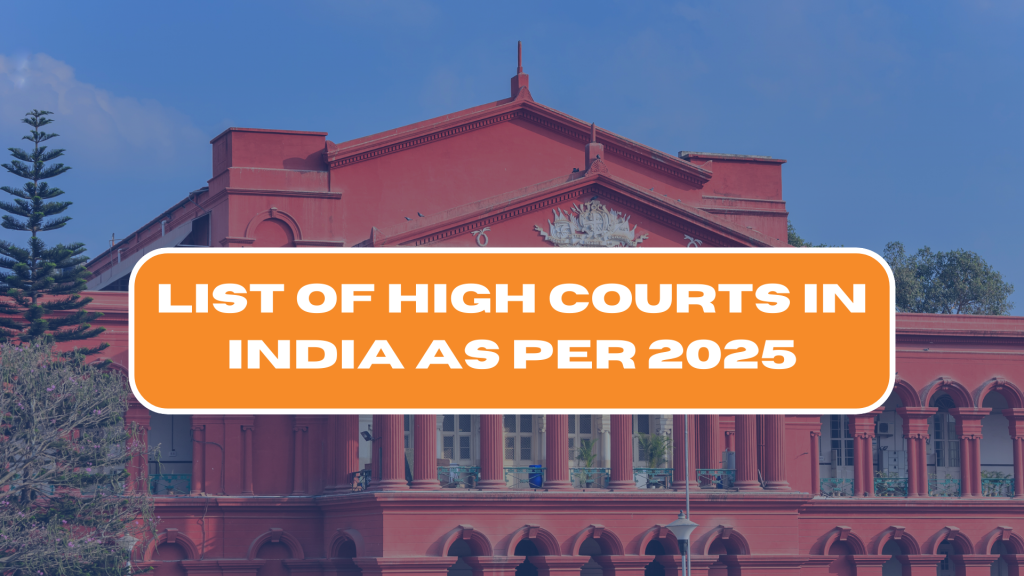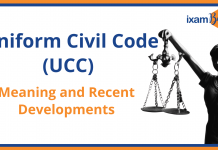India, the world’s largest democracy, boasts a well-developed judicial system operating at different levels. The High Courts of India are an important part of the judicial system in India and are the highest courts at the state level. These High Courts have judicial review power over laws and judgments within their jurisdiction.
The supreme judiciary power of the state is the High Court. According to Article 214 of the Indian constitution, Every Indian state must be provided with a High Court. Article 231 does mention that there may be a common High Court for two or more states, or two or more states and two or more union territories. The aspirants of all competitive exams must know the number of High Courts in India.
It is necessary to know about High Courts in India for several competitive exams like civil services exams (UPSC), state public service commission exams (such as PCS, PSC), law entrance exams (CLAT, AILET), judiciary exams, and other general knowledge-based exams.
With the beginning of the year 2025, one should be aware of the Indian High Courts’ composition. Below is a full list of High Courts in India as of 2025.

List of High Courts in India
| Year | Name | Territorial Jurisdiction | Seat & Bench |
| 1862 | Bombay | Maharashtra, Dadra & Nagar Haveli and Daman & Diu, Goa | Seat: Mumbai; Bench: Panaji, Aurangabad, Nagpur |
| 1862 | Kolkata | West Bengal, Andaman & Nicobar Islands | Seat: Kolkata; Bench: Port Blair |
| 1862 | Madras | Tamil Nadu, Pondicherry | Seat: Chennai; Bench: Madurai |
| 1866 | Allahabad | Uttar Pradesh | Seat: Allahabad; Bench: Lucknow |
| 1884 | Karnataka | Karnataka | Seat: Bengaluru; Bench: Dharwad, Gulbarga |
| 1916 | Patna | Bihar | Seat: Patna |
| 1948 | Guwahati | Assam, Nagaland, Mizoram, Arunachal Pradesh | Seat: Guwahati; Bench: Kohima, Aizawl, Itanagar |
| 1949 | Odisha | Odisha | Seat: Cuttack |
| 1949 | Rajasthan | Rajasthan | Seat: Jodhpur; Bench: Jaipur |
| 1956 | Madhya Pradesh | Madhya Pradesh | Seat: Jabalpur; Bench: Gwalior, Indore |
| 1958 | Kerala | Kerala, Lakshadweep | Seat: Ernakulam |
| 1960 | Gujarat | Gujarat | Seat: Ahmedabad |
| 1966 | Delhi | Delhi | Seat: Delhi |
| 1971 | Himachal Pradesh | Himachal Pradesh | Seat: Shimla |
| 1975 | Punjab & Haryana | Punjab, Haryana, Chandigarh | Seat: Chandigarh |
| 1975 | Sikkim | Sikkim | Seat: Gangtok |
| 2000 | Chhattisgarh | Chhattisgarh | Seat: Bilaspur |
| 2000 | Uttarakhand | Uttarakhand | Seat: Nainital |
| 2000 | Jharkhand | Jharkhand | Seat: Ranchi |
| 2013 | Tripura | Tripura | Seat: Agartala |
| 2013 | Manipur | Manipur | Seat: Imphal |
| 2013 | Meghalaya | Meghalaya | Seat: Shillong |
| 2019 | Telangana | Telangana | Seat: Hyderabad |
| 2019 | Andhra Pradesh | Andhra Pradesh | Seat: Amravati |
| 2019 | Jammu & Kashmir and Ladakh | Jammu & Kashmir, Ladakh | Shared High Court |
High Courts of India
- The Structure of High Court
- A Chief Justice and other judges are appointed by the President to each High Court
- For the High Courts, there are no fixed numbers of judges. It varies from court to court and from state to state.
- Tenure and Qualifications
- No one can be appointed a High Court Judge unless he or she is an Indian citizen
- He should have served in a judicial capacity in India’s land for ten years
- He has been a supporter of one or more High Courts for a period of at least ten years
Powers and Functions of the High Court
High Courts in India
In India, the High Court is the superior court in each state. Articles 214 to 231 of the Indian Constitution regulate the powers and organization of the High Courts. The Parliament may establish one High Court to serve two or more states.
- Example 1: Haryana, Punjab, and Chandigarh
- There is a shared High Court among Haryana, Punjab, and the Union Territory of Chandigarh.
- This provision aids in the optimal utilization of resources and enhances the effectiveness of the judicial system in such areas.
- Example 2: Northeastern states
- The northeastern states of India also possess one High Court.
- This aids in the administration of justice more effectively and simplifying legal procedures in the area.
- Example 3: Tamil Nadu and Puducherry
- Tamil Nadu and the Union Territory of Puducherry share a common High Court.
- This allows for smooth legal proceedings and ensures uniformity in the enforcement of laws in these regions.
- Example 4: Maharashtra and Daman and Diu
- Maharashtra and Union Territory of Daman and Diu have the Bombay High Court in common.
- The Bombay High Court, which was formed in 1862, has jurisdiction over Maharashtra, Daman and Diu, and Dadra and Nagar Haveli.
- The division benches of the Bombay High Court are situated in Mumbai, Aurangabad, and Nagpur.
The pooling of High Courts among states or territories has many benefits. It saves the construction and running expenditure involved in setting up new High Courts. Furthermore, it results in faster delivery of justice, decreases pendency of cases, and ensures consistency in laws and regulations.
Though every state in India possesses a High Court of its own, the common sharing of High Courts among states or even territories turns out to be a convenient and effective way of dispensing justice and taking care of legal matters.
High Court Jurisdiction
Following is an overview of the High Court’s various types of jurisdiction:
Original Jurisdiction: it refers to the fact that the applicant may approach the High Court directly and not through appeals. This power is exercised in the following cases –
- Disputes arising out of relating to members of Parliament and state legislative assembly
- Relating to marriage, law, admiralty divorce, contempt of court, etc
- Enforcement of fundamental rights (Supreme Court also possesses this power)
- Cases retransferred from other courts to themselves which entails an issue of law
Appellate Jurisdiction
- In civil cases: a district court decision can be appealed to the High Court.
- If the dispute is for Rs. 5000/- or involves an issue of fact or law, an appeal may be preferred directly from the lower court
- It also extends to Sessions and Additional Sessions Judges’ decisions in criminal cases: Whether the session judge has sentenced any person to imprisonment for seven years or more
Whether a session judge has made a decision on capital punishment
- The High Court has jurisdiction over all suits arising under state or federal law
- If the High Court certifies that a case presents a substantial question of law in a constitutional case
High Court Powers
- As Court of Record:
- High Courts are also Courts of Record (such as the Supreme Court)
- Subordinate courts can make rulings in cases using the records of High Court decisions
- All High Courts can punish anybody or any institution for contempt of
Administrative Powers
- Monitors and oversees all the subordinate courts
- Can order information of proceedings from subordinate courts
- Sets rules for the functioning of the subordinate courts
- Has the jurisdiction to transfer cases from one court to another, and to transfer cases to itself and decide on them
- Has the power to inquire into the records of any subordinate court or other documents connected therewith
- Also has the power to appoint its administrative personnel and determine their remuneration, allowances, and conditions of service
Power of Judicial Review: Judicial review power lies with the High Courts. In case a law or ordinance is illegal according to the Indian Constitution, they can declare it unconstitutional.
Important Terms related to High Courts in India
The High Court is the ultimate guardian of law and order in India. It serves as the highest authority on matters related to the administration of justice, and plays a critical role in safeguarding the fundamental rights of citizens. Let’s explore some of the most important terms related to High Courts in India.
Tribunal: Whether or not it is called a tribunal in its title, a tribunal is a word for someone operating in a judicial capacity. For example, an advocate standing before a Court with only one Judge could refer to that judge as “their tribunal.”
Permanent Bench: A permanent bench is made up of one or more High Court judges who sit all year at a different venue than the High Court’s permanent seat.
Jurisdiction: The jurisdiction of the High Court refers to the geographical area to which it has the power to administer justice. Each High Court has its own jurisdiction, which is usually determined by the state in which it is located.
Writs: A writ is a legal order issued by the High Court to enforce the fundamental rights of citizens. There are several types of writs that can be issued by the High Court, including habeas corpus, mandamus, and certiorari.
Appeal: An appeal is a request to have a higher court review a decision made by a lower court. The High Court is often the court of appeal for decisions made by lower courts and tribunals.
Sessions Court: The Sessions Court is a lower court that is responsible for trying criminal cases. Appeals from the Sessions Court are often made to the High Court.
Original Jurisdiction: The High Court also has original jurisdiction, which means that it can hear cases directly without requiring them to first be heard by a lower court.
Chief Justice: The Chief Justice is the head of the High Court and is responsible for the administration of justice within its jurisdiction. They are appointed by the President of India and serve until they reach retirement age.
Collegium System: The Collegium System is the process by which judges are appointed to the High Court and the Supreme Court. Under this system, a group of senior judges is responsible for making recommendations to the government regarding appointments.
Article 226: Article 226 of the Indian Constitution empowers the High Court to issue writs to any person or authority within its jurisdiction. This is an important provision that helps safeguard the rights of citizens.
Article 227: Article 227 of the Indian Constitution gives the High Court the power of superintendence over all lower courts and tribunals within its jurisdiction. This means that the High Court can issue orders and directions to these courts to ensure justice is served.
District Court: The District Court is the lower court that is responsible for trying civil cases. Appeals from the District Court can also be made to the High Court.
Circuit Bench: A Circuit Bench is for jurisdictions that are spread out but don’t have enough cases to warrant a full-fledged permanent bench. As a result, certain judges fly to these areas once or twice a year to hear all of the High Court appeals in that jurisdiction.
Division Bench: An argument is heard and judged by at least two judges in a Division Bench.
Full Bench: A full bench applies to a court of law with a larger number of judges than normal.
Conclusion
Having knowledge of the list of High Courts in India as per 2025 is essential for exam preparation. It enables a comprehensive understanding of the Indian judiciary system, its hierarchy, and the jurisdictions of each High Court. Studying and memorizing this list will undoubtedly prove beneficial for those pursuing a career in law and those appearing for competitive exams in the legal field.
If you are preparing for the IBPS PO exam, ixamBee is your ultimate guide to success! Get access to high-quality IBPS PO Mains mock tests, IBPS PO Prelims PYP, and a well-structured IBPS RRB PO & Clerk online course designed by experts. Our Target IBPS PO online course ensures focused preparation with expert guidance, practice tests, and study material. Enroll now at ixamBee and boost your chances of success in the IBPS PO 2025 exam!
At ixamBee, we specialize in providing comprehensive online courses for government exams and online courses for government jobs. Our expertly designed courses for government jobs cater to a wide range of upcoming government exams. Whether you’re preparing for specific courses for government exams or seeking general guidance, ixamBee offers the resources like Beepedia previous year papers, SSC CGL, SSC CHSL, SSC MTS and other mock tests to succeed in exams like RBI Grade B, SEBI Grade A, NABARD Grade A, RRB NTPC, SSC MTS, NIACL Assistant, and more.
Also Read:
10 Easiest Competitive Exams in India
Why SSC Exams are a Ray of Hope for Job Seeking Youth
How are Non-Banking Financial Companies (NBFCs) Different from Regular Banks?














